
to the last I grapple with thee; from hell’s heart I stab at thee; for hate’s sake I spit my last breath at thee
― Herman Melville, Moby-Dick; or, The Whale
In her room at Mercy Hospital, Cecilia was sedated and kept in a locked room. The next morning, Dr. Emelina Arocha, a consulting psychiatrist who trained originally in Cuba, agreed to take her case.  Dr. Arocha walked into Cecilia’s room, and sat in the chair next to her bed. As Cecilia awakened from her drugged sleep, she glanced up at Dr. Arocha, and screamed. Dr. Arocha pressed the button next to Cecilia’s bed to summon the
Dr. Arocha walked into Cecilia’s room, and sat in the chair next to her bed. As Cecilia awakened from her drugged sleep, she glanced up at Dr. Arocha, and screamed. Dr. Arocha pressed the button next to Cecilia’s bed to summon the 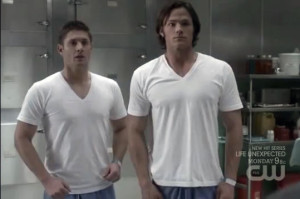 orderlies and a
orderlies and a  psychiatric nurse. As they entered the room, Cecilia screamed again, louder this time. The two burly men held Cecilia down, while Dr. Arocha told the nurse to administer 50 mg of thorazine, iv. The nurse went to get the hypodermic needle and medication. Cecilia continued to scream, saying, “No – no – I am not crazy. Don’t give me that shot!” The nurse returned and administered the medication. Cecilia slumped back on the bed.
psychiatric nurse. As they entered the room, Cecilia screamed again, louder this time. The two burly men held Cecilia down, while Dr. Arocha told the nurse to administer 50 mg of thorazine, iv. The nurse went to get the hypodermic needle and medication. Cecilia continued to scream, saying, “No – no – I am not crazy. Don’t give me that shot!” The nurse returned and administered the medication. Cecilia slumped back on the bed.
Cecilia was transported back to  Lyubertsy and the nursing home there where she nearly died. Dr. Tereshkova entered her room and sat next to her bed. Cecilia said, “Why am I still here? How did I get back here?” Dr. Tereshkova looked at her notes, then up at Cecilia. You have undergone so many traumas in such a short period of time, it’s a wonder you are still alive. But I’m here to help you. What do you want to know?”
Lyubertsy and the nursing home there where she nearly died. Dr. Tereshkova entered her room and sat next to her bed. Cecilia said, “Why am I still here? How did I get back here?” Dr. Tereshkova looked at her notes, then up at Cecilia. You have undergone so many traumas in such a short period of time, it’s a wonder you are still alive. But I’m here to help you. What do you want to know?”
Cecilia said, “Tell me how I got here.” The doctor took the glasses from her chest and put them on her face. She flipped back through the pages on her clipboard, read her notes, and then removed her glasses. “You sustained a serious head trauma at the United Nations building, as a result of a terrorist explosion. You were treated and released from the hospital, but you are far from recovered. But you should just be grateful to be alive, all things considered.”
Cecilia said, “I”m not sure what you mean by that.” Dr. Tereshkova looked deeply into Cecilia’s eyes. “There have been some significant mishaps inflicted on several of the individuals with whom you have worked these last few months. 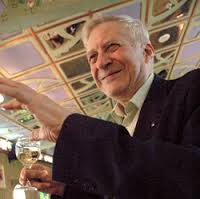 Dr. Kardashev, a great hero of the old Soviet Union’s program of astronomy, is dead. He was allegedly poisoned by his wife, Tatiana. The poison was
Dr. Kardashev, a great hero of the old Soviet Union’s program of astronomy, is dead. He was allegedly poisoned by his wife, Tatiana. The poison was 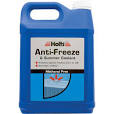 ethylene glycol, and the Moscow detectives found the
ethylene glycol, and the Moscow detectives found the  piroshki that remained on his dinner plate laced with the chemical. She is in the
piroshki that remained on his dinner plate laced with the chemical. She is in the 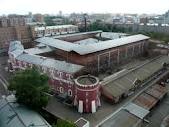 Butyrka prison, awaiting trial for murder. But there seems little likelihood of a conviction, since there is no evidence whatsoever that she committed the crime.”
Butyrka prison, awaiting trial for murder. But there seems little likelihood of a conviction, since there is no evidence whatsoever that she committed the crime.”
Ludmila once again referred to her notes. “A second, interesting case arose with another of your cohorts, Susan Smith? Do you recall that name?” Cecilia nodded. Ludmila said, “The authorities assumed Mrs. Smith decided to experiment with injecting  botox to smooth out some facial wrinkles. Unfortunately, the wrong strain of botulinium was used, and severely affected her breathing. Her body was found on the 2nd floor of her home by her granddaughter. The body was already in rigor mortis. One must be very careful when trying to administer any medication to oneself, don’t you agree Dr. Vasquez?” Ludmila looked expectantly at Cecilia. All she could do was nod, since she found herself restrained in her bed.
botox to smooth out some facial wrinkles. Unfortunately, the wrong strain of botulinium was used, and severely affected her breathing. Her body was found on the 2nd floor of her home by her granddaughter. The body was already in rigor mortis. One must be very careful when trying to administer any medication to oneself, don’t you agree Dr. Vasquez?” Ludmila looked expectantly at Cecilia. All she could do was nod, since she found herself restrained in her bed.
“Finally, there was the situation with the young man who may be related to you – ![]() Javier Vasquez? My understanding is that his mother prepared a
Javier Vasquez? My understanding is that his mother prepared a  cassava cake with improperly prepared cassava. You may not be aware of this, but cassava contains fairly large quantities of cyanide that must be leached out in the process of making the flour. The assumption was that, Javier’s mother neglected to do this, and the young fellow nearly died from cyanide poisoning.” Ludmila looked at Cecilia expectantly.
cassava cake with improperly prepared cassava. You may not be aware of this, but cassava contains fairly large quantities of cyanide that must be leached out in the process of making the flour. The assumption was that, Javier’s mother neglected to do this, and the young fellow nearly died from cyanide poisoning.” Ludmila looked at Cecilia expectantly.
Cecilia said, “Doesn’t it seem strange that all three of them either died or nearly died from a toxin?”
The doctor said, “Yes, it did seem strange to me. Quite a coincidence. But here you are – the one connection between the three of them – and it’s clear you are insane. Might there be a connection here? Were you responsible for what happened to these people?”
Cecilia said, “No – of course not. I have been in hospital for months and have had no contact with any of them. But I am so sad to hear that Nikolai and Susan are gone.” With that, Cecilia began to feel terribly alone. She could not restrain her emotions, and began to cry.
Dr. Tereshkova’s face began to fade, and then become clear again. But it wasn’t Ludmila – it was another  woman who greatly resembled her Russian psychiatrist. This one was also holding a case chart and wearing spectacles. Cecilia forced herself to stop crying, and asked “Who are you? And where am I? Am I back in Lyubertsy? Where’s Dr. Tereshkova?”
woman who greatly resembled her Russian psychiatrist. This one was also holding a case chart and wearing spectacles. Cecilia forced herself to stop crying, and asked “Who are you? And where am I? Am I back in Lyubertsy? Where’s Dr. Tereshkova?”
The woman with the chart waited for her to stop asking questions before she replied. “I am Dr. Emelina Arocha.” The doctor reached out her hand to shake Cecilia’s, but then realized how foolish that was since Cecilia’s were restrained. Instead, she patted Cecilia’s arm. “You are in the 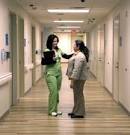 Behavioral Health unit at Mercy Hospital. This hospital is in Miami, Florida, so it’s clear you are not in Lyubertsy, wherever that is. And I don’t know any Dr. Tereshkova, so I can’t help you there.”
Behavioral Health unit at Mercy Hospital. This hospital is in Miami, Florida, so it’s clear you are not in Lyubertsy, wherever that is. And I don’t know any Dr. Tereshkova, so I can’t help you there.”
Cecilia nodded at all this, and tried to remained calm. Dr. Arocha asked, “Why did you scream and lose control when you saw me and the orderlies earlier today?” Cecilia said, “I thought I was back in Russia – in Lyubertsy at a nursing home there. I’d been visiting a co-worker and was helping him find an answer to a problem with his research. Jet lag got the best of me, and I passed out, hitting my head on a table corner. Dr. Tereshkova was my psychiatrist there. She helped me get back on my feet so I could return home.”
Dr. Arocha was writing notes the entire time Cecilia was speaking. “I understand from speaking with your mother that you’ve had another, more recent and apparently more serious trauma. Can you tell me anything about that?”
Cecilia nodded again. “Yes, but may I have a drink of water? My throat is very dry.”
Emelina got up, and went over to the cart where a  carafe of water and plastic cup were sitting. She put the water in the cup, and then helped Cecilia drink from it. Cecilia said, “Thank you.” She cleared her throat and tried to reflect back on the occurrences of the past few months. Doing so made her head hurt, and she winced with pain – both physical and emotional.
carafe of water and plastic cup were sitting. She put the water in the cup, and then helped Cecilia drink from it. Cecilia said, “Thank you.” She cleared her throat and tried to reflect back on the occurrences of the past few months. Doing so made her head hurt, and she winced with pain – both physical and emotional.
“I was at the  United Nations building in New York. An Israeli that I believed to be a computer hacker was speaking to the assembly, explaining his role in a hoax that he’d perpetrated, regarding the mining of helium-3 on the moon. But, in fact, Ishmael was a terrorist, who activated a suicide vest, and blew up the room. I required months of physical therapy, but I’m still struggling to recover. I think I poisoned my mother’s dog, because I thought he intended to harm me. That is all I recall.”
United Nations building in New York. An Israeli that I believed to be a computer hacker was speaking to the assembly, explaining his role in a hoax that he’d perpetrated, regarding the mining of helium-3 on the moon. But, in fact, Ishmael was a terrorist, who activated a suicide vest, and blew up the room. I required months of physical therapy, but I’m still struggling to recover. I think I poisoned my mother’s dog, because I thought he intended to harm me. That is all I recall.”
Emelina said, “Well, that certainly comports with the information I received from your mother. She was upset about the dog, but she’s very much worried about you. She believes you are not the same person you were before your injury. Would you agree with her assessment?”
Cecilia replied, “I feel fine at this moment. Could you possibly take these restraints off my arms?”
Emelina said, “Yes. I’ll call the orderlies in to do that in a few minutes. But I’d like to talk about your injury some more, to better understand what’s happened to you, so I can make a diagnosis and recommend a course of treatment.”
For the next fifteen minutes, Dr. Arocha probed Cecilia, asking for details regarding the day of the meeting. Gradually, Cecilia had regained her memory of that day, and recounted, nearly perfectly, every detail. When Cecilia had finished with her recitation, Dr. Arocha put down the case chart, and removed her glasses. “It would appear your memory has returned. My understanding from consultations with your neurosurgeon,  Dr. Lin at New York Presbyterian, was that you recalled nothing of the incident, early-on. That is not unusual in head trauma cases, particularly those that involve swelling of the brain. It takes time for those blood vessels to heal, and connections remade to the memory center in the cerebral cortex.
Dr. Lin at New York Presbyterian, was that you recalled nothing of the incident, early-on. That is not unusual in head trauma cases, particularly those that involve swelling of the brain. It takes time for those blood vessels to heal, and connections remade to the memory center in the cerebral cortex.
But now that you recall, I can tell you that the terrorist you mentioned was not, in fact, an Israeli. According to the information I gleaned from The Miami Herald, the NSA reported he is an 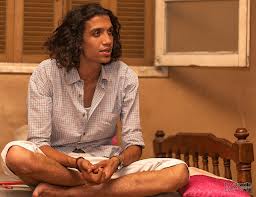 Egyptian terrorist, well known to the authorities both in Egypt and other, troubled parts of the Middle East. His name is Ishmael Gahiji, and it would appear he was killed in the blast. Unfortunately, he was successful in exacting revenge for a massacre of some of his fellow terrorists by the Egyptian government in Sinai. His story about The Holocaust was intended to start some kind of war between the US and Israel. Clearly he did not succeed in that portion of his plot.”
Egyptian terrorist, well known to the authorities both in Egypt and other, troubled parts of the Middle East. His name is Ishmael Gahiji, and it would appear he was killed in the blast. Unfortunately, he was successful in exacting revenge for a massacre of some of his fellow terrorists by the Egyptian government in Sinai. His story about The Holocaust was intended to start some kind of war between the US and Israel. Clearly he did not succeed in that portion of his plot.”
Cecilia just nodded while Dr. Arocha spoke. But something in the back of her mind told her that this was some kind of ruse – that the Ishmael she’d dealt with was not the person the NSA had identified. Cecilia knew she had to find some way to get in touch with Emily, and find out what was really going on. But first, she had to get out of these wrist shackles, and try to convince this doctor that she was sane and rational. Cecilia wasn’t entirely sure that she could pull that off, but she was determined to try.
